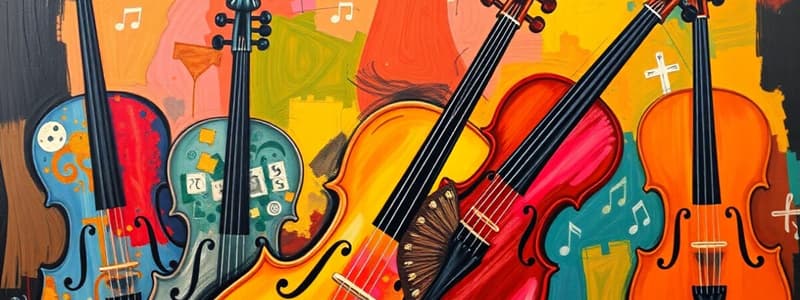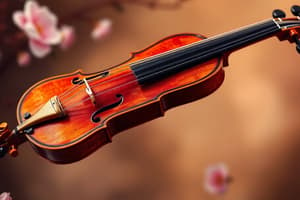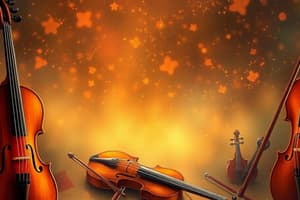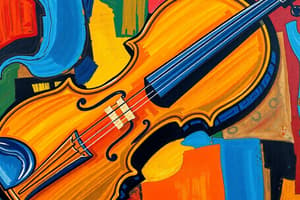Podcast
Questions and Answers
How is the violin typically played?
How is the violin typically played?
- Held against the chest and plucked with the fingers.
- Held between the knees and the bow moved across the strings.
- Placed on the floor and struck with a mallet.
- Held under the chin, with the bow held in the right hand, and the left hand pressing the strings on the neck. (correct)
Which instrument is considered a likely ancestor of the Arabic rabab?
Which instrument is considered a likely ancestor of the Arabic rabab?
- Kobyz (correct)
- Vielle
- Viola di braccio
- Rebec
What distinguished the rebec from the rabab?
What distinguished the rebec from the rabab?
- The rebec had silk strings and the rabab had gut strings.
- The rebec had a longer neck than the rabab, enabling a wider range of notes.
- The rebec typically had five strings and a wooden body, unlike the rabab which had two silk strings and a gourd body. (correct)
- The rebec was played on the floor and the rabab was held under the chin.
What was a characteristic of the vielle?
What was a characteristic of the vielle?
Who is considered the father of the modern violin?
Who is considered the father of the modern violin?
What was a prominent feature of the viola di braccio?
What was a prominent feature of the viola di braccio?
What is the relationship between Antonio Stradivari and Andrea Amati?
What is the relationship between Antonio Stradivari and Andrea Amati?
Which cities were important violin-making centers in the 17th and 18th centuries?
Which cities were important violin-making centers in the 17th and 18th centuries?
When did the violin become a standard orchestral instrument?
When did the violin become a standard orchestral instrument?
What is the approximate range of a violin?
What is the approximate range of a violin?
Flashcards
Violin
Violin
The smallest and highest-pitched orchestral string instrument.
How is a violin held?
How is a violin held?
The violin is held under the chin.
How is the bow used?
How is the bow used?
The bow is drawn across the strings at an angle.
Left hand's role in playing
Left hand's role in playing
Signup and view all the flashcards
Rebec
Rebec
Signup and view all the flashcards
Vielle
Vielle
Signup and view all the flashcards
Viola di braccio
Viola di braccio
Signup and view all the flashcards
Antonio Stradivari
Antonio Stradivari
Signup and view all the flashcards
Violin-making centers
Violin-making centers
Signup and view all the flashcards
Violin range
Violin range
Signup and view all the flashcards
Study Notes
Violin History
- Violins are the smallest and highest-pitched orchestral string instruments
- They are commonly used with other instruments like viola, cello, double bass, and harp
- Violins have been traditionally used to accompany singing and dancing
- Ancient instruments in Central Asia (like the kobyz and kyl kyyak) were forerunners of the Arabic rabab
- The Arabic rabab, from the Middle East (800s), had a pear-shaped gourd, silk strings, and a long neck; it was played on the lap or floor
- The rebec (1000s, Europe) was a variation of the rabab, with five strings and a flat wooden body; it was held on the shoulder
- The vielle (1200s, France) had five strings and a C-shaped body; it was more similar to a modern violin
- The viola di braccio (1500s, Italy) resembled the vielle, having only three strings and an f-shaped body, similar to a modern violin
- Andrea Amati (1555) is known as the father of the modern violin; he created the first four-string violin
- Antonio Stradivari (1644-1737) trained under Amati’s grandson and built world-famous violins.
- Venice, Cremona, Brescia, and Innsbruck in Italy and Austria became important violin-making centers in the 1600s-1700s
- Violins became a regular part of orchestras and chamber music in the Baroque period (1600s)
Violin Construction and Playing
- The violin is held under the chin, with the bow in the right hand
- The bow is drawn across the strings at a right angle while the left hand presses on strings
- The violin has a chin rest and different parts, e.g., tailpiece, bridge, and f-holes
Studying That Suits You
Use AI to generate personalized quizzes and flashcards to suit your learning preferences.



